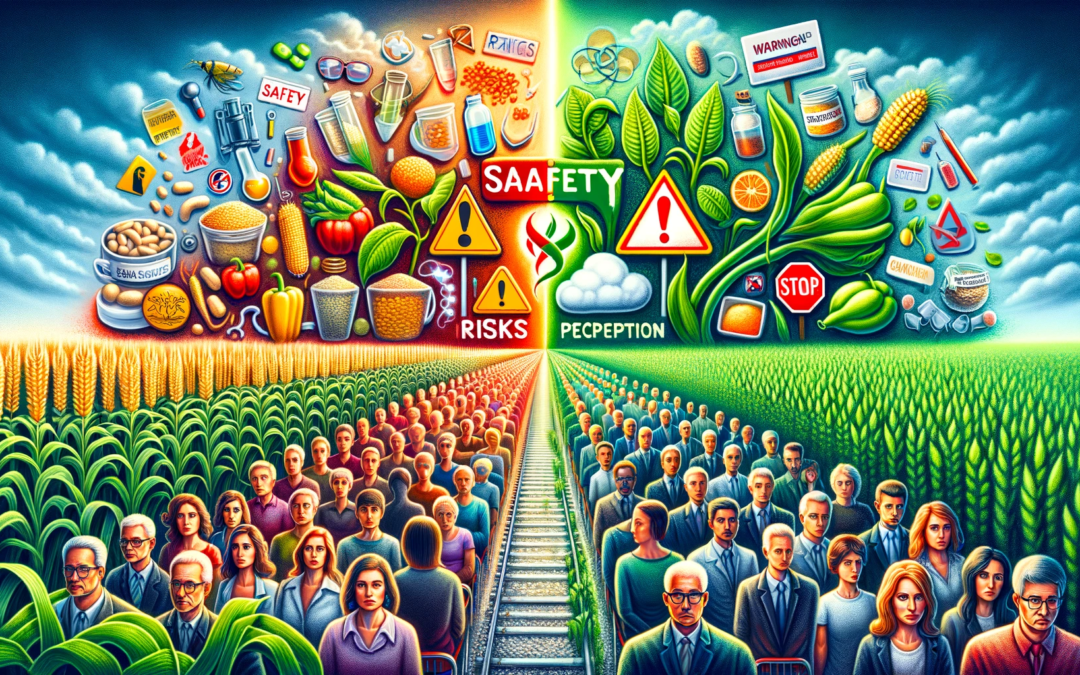Section 4: Safety, Risks, and Public Perception
The conversation around genetically modified (GM) foods is as complex as it is contentious, intertwining scientific findings with public sentiment and ethical considerations. Central to this discussion are the safety concerns, potential risks, and varying global perceptions associated with GM foods.
Safety Concerns and Potential Risks:
Health Implications:
Concerns about the safety of GM foods for human consumption have been a focal point of debate. Critics often point to the potential for allergic reactions, gene transfer, and outcrossing—the movement of genes from GM to non-GM crops. While numerous scientific studies, including those by organizations like the World Health Organization (WHO) and the American Medical Association (AMA), have found no inherent risk in consuming GM foods, skepticism persists among certain segments of the population.
Environmental Impact:
Environmental risks include the potential loss of biodiversity, particularly through the unintentional cross-breeding of GM with wild plant populations. There is also concern about the development of ‘superweeds’ and pest resistance due to the overuse of herbicide-tolerant GM crops.
Debate Over Health Implications and Public Perception:
Scientific Consensus vs. Skepticism:
While the scientific community largely agrees on the safety of GM foods, public perception varies significantly. In some regions, particularly in Europe, there is considerable public skepticism and resistance to GM foods. Media portrayal and public campaigns have played a role in shaping opinions, sometimes overshadowing scientific evidence with anecdotal or unverified claims.
Global Variations in Acceptance:
Public acceptance of GM foods varies greatly around the world. In the United States, GM foods have been widely adopted and are generally accepted, whereas in Europe, there is more resistance and stringent regulations. In developing countries, the debate often centers around the potential benefits of GM crops for food security versus concerns about dependency on multinational corporations for seeds and technology.
Ethical Considerations and Balancing Innovation with Safety:
Ethical Dilemmas:
Ethical issues include the ‘right to know’—whether consumers should be informed about the GM status of their food through labeling. This ties into broader debates about transparency and consumer choice. The control of patented GM technology by a few large corporations raises concerns about the monopolization of food sources and the ethical implications of ‘owning’ biological material.
Regulatory Challenges:
Regulating GM foods presents a challenge, requiring a balance between fostering innovation and ensuring public safety. This involves rigorous testing for health and environmental impacts before approval. The disparities in regulatory frameworks across different countries reflect the diverse perspectives on GM foods and complicate international trade.
Conclusion:
The safety, risks, and public perception of genetically modified foods remain a complex and evolving issue. It is a field where science, public opinion, and ethics converge, requiring ongoing dialogue and research. Ensuring the safety of GM foods is paramount, as is addressing the environmental and ethical concerns associated with their use. As biotechnology continues to advance, it is crucial that innovation in food production is matched with a commitment to safety, transparency, and ethical responsibility. The future of genetically modified foods will be shaped not only by scientific advancements but also by the global community’s ability to navigate these multifaceted challenges.










